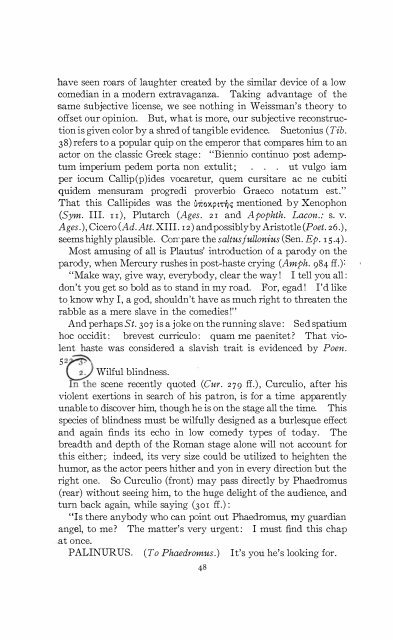Create successful ePaper yourself
Turn your PDF publications into a flip-book with our unique Google optimized e-Paper software.
have seen roars of laughter created by the similar device of a low<br />
comedian in a modern extravaganza. Taking advantage of the<br />
same subjective license, we see nothing in Weissman's theory to<br />
offset our opinion. But, what is more, our subjective reconstruction<br />
is given color by a shred of tangible evidence. Suetonius (Tib.<br />
38) refers to a popular quip on the emperor that compares him to an<br />
actor on the classic Greek stage : "Biennio continuo post ademp<br />
tum imperium pedem porta non extulit ; ut vulgo iam<br />
per iocum Callip (p)ides vocaretur, quem cursitare ac ne cubiti<br />
quidem mensuram progredi proverbio Graeco notatum est."<br />
That this Callipides was the uio'X.pt't mentioned by Xenophon<br />
(Sym. III. II) , Plutarch (Ages. 21 and Apophth. Lacon.: s. v.<br />
Ages.), Cicero (Ad.Att. XIII. 12) and possibly by Aristotle (Poet. 26.) ,<br />
seems highly plausible. Corr.pare the saltusfullonius (Sen. Ep. 15.4).<br />
Most amusing of all is Plautus' introduction of a parody on the<br />
parody, when Mercury rushes in post-haste crying (Amph. 984 ff.):<br />
"Make way, give way, everybody, clear the way ! I tell you all :<br />
don't you get so bold as to stand in my road. For, egad ! I'd like<br />
to know why I, a god, shouldn't have as much right to threaten the<br />
rabble as a mere slave in the comedies !"<br />
And perhaps St. 307 is a joke on the running slave : Sed spatium<br />
hoc occidit : brevest curriculo : quam me paenitet ? That violent<br />
haste was considered a slavish trait is evidenced by Poen.<br />
5 2<br />
Wilful blindness.<br />
e scene recently quoted (Cur. 279 ff.), Curculio, after his<br />
violent exertions in search of his patron, is for a time apparently<br />
unable to discover him, though he is on the stage all the time. This<br />
species of blindness must be wilfully designed as a burlesque effect<br />
and again finds its echo in low comedy types of today. The<br />
breadth and depth of the Roman stage alone will not account for<br />
this either ; indeed, its very size could be utilized to heighten the<br />
humor, as the actor peers hither and yon in every direction but the<br />
right one. So Curculio (front) may pass directly by Phaedromus<br />
(rear) without seeing him, to the huge delight of the audience, and<br />
turn back again, while saying (301 ff.) :<br />
"Is there anybody who can point out Phaedromus, my guardian<br />
angel, to me ? The matter's very urgent : I must find this chap<br />
at once.<br />
PAL<strong>IN</strong>URUS. (To Phaedromus.) It's you he's looking for.<br />
48
















